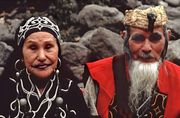Ainu

]
The Ainu (pronounced "eye-nu") to quote the Ainu Museum:
- "Ainu" means "human." The Ainu people regard things useful to them or beyond their control as "kamuy"(gods). In daily life, they prayed to and performed various ceremonies for the gods. These gods include : "nature" gods, such as of fire, water, wind and thunder ; "animal" gods, such as of bears, foxes, spotted owls and gram-puses ; "plant" gods, such as of aconite, mush-room and mugwort ; "object" gods, such as of boats and pots ; and gods which protect houses, gods of mountains and gods of lakes. The word "Ainu" refers to the opposite of these gods.
The Ainu, along with the Okinawa-based Ryukyu, are an indigenous population of Japan. Ainu lived in Hokkaido, the Kurile Islands and Sakhalin, but now largely live in Hokkaido, Japan's northernmost island. As of the last census Ainu populations in Hokkaido were roughly 23,000 people.
In traditional Ainu culture when a woman begins to come of age at 12-13 she begins a heavy tattooing process of her lips, legs, hands and arms. When this process has been completed somewhere around the age of 15-16 she is considered ready for marriage. Ainu culture held tattooed women to be beautiful. As Helena Burton notes on the meanings of the tattoos:
- The implication being that the arms and hands must work for the husband and the lips must speak for him. The anchipiri (blackstone mouth) tattoo came to be seen as very beautiful and soon Ainu women believed that there was no salvation after death without tattooed lips.
[Gerald Vizenor|http://www.hanksville.org/storytellers/vizenor/], in his book Hiroshima Bugi: Atomu 57 plays a great deal with the history of both American native cultural history as well as the discriminatory practices of the Japanese against the Ainu against the backdrop of playful terrorism. Main character Ronin Browne, half Aniishinabe and half Japanese, at one point is tattooed with disappearing chrysanthemums during an Ainu religious ceremony.
